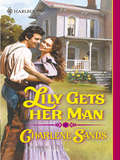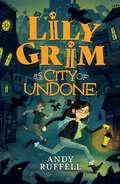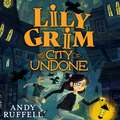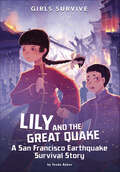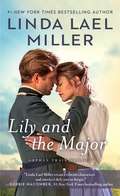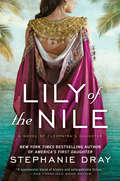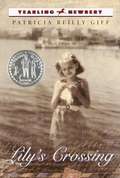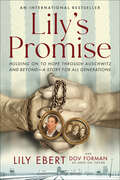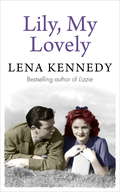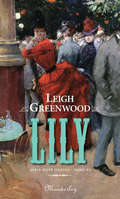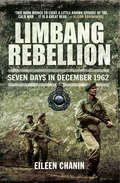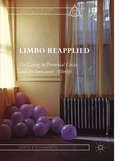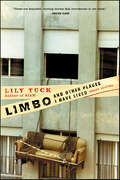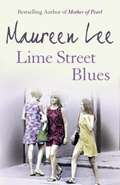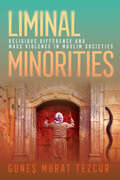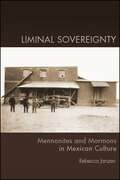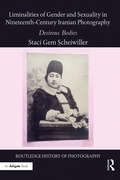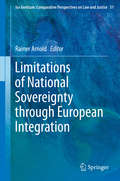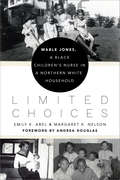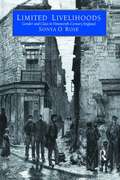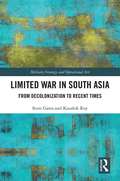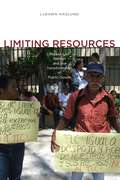- Table View
- List View
Lily Gets Her Man
by Charlene SandsLily Brody had eyes for the most handsome man in Sweet Springs, Texas-Tyler Kincaide. But she was unable to speak and walk gracefully around him. So when he asked her a matrimonial question, Lily was delighted...then insulted! How could she marry a man who didn't love her, a man who only wanted a nanny for his child?Widower Tyler Kincaide never wanted to marry again. But he needed someone special to help raise his rambunctious daughter. Lily Brody had morals, and yet Tyler couldn't understand her refusal of him. She got under his skin. Soon, Tyler wanted to give her everything-family, marriage...and his love. The question was, would she accept him?
Lily Grim and The City of Undone
by Andy RuffellLily Grim's life is a mystery.She has lived with her guardian Gabriel, in their rundown second-hand shop in the City of Undone, for as long as she can remember.For years, the city-dwellers have lived in uneasy discord with The Others - a community of wanderers forced to shelter within the city walls, after they were driven from their nomadic camps in the wilderness. But Undone is a dark and dangerous place to live, especially if you're an Other: feared for their special gifts, they are persecuted by the cruel Master of the City, and taken to the Ring - a prison from which few ever return. When the Master captures Gabriel and throws him into the Ring, Lily is saved by a young Other boy called Dekka. He introduces her to a whole Otherworld that exists beneath the City of Undone. To her astonishment Lily discovers she is an Other, too - with powerful gifts - and is now in grave danger: because the Master wants her dead. But why?Can Lily find answers about who she is, and where she's from. And can the new friends rescue Gabriel, before it's too late?
Lily Grim and the City of Undone
by Andy RuffellLily Grim's life is a mystery. She has lived with her guardian Gabriel, in their rundown second-hand shop in the City of Undone, for as long as she can remember. <p><p>For years, the city-dwellers have lived in uneasy discord with The Others—a community of wanderers forced to shelter within the city walls, after they were driven from their nomadic camps in the wilderness. But Undone is a dark and dangerous place to live, especially if you're an Other: feared for their special gifts, they are persecuted by the cruel Master of the City, and taken to the Ring—a prison from which few ever return. <p><p>When the Master captures Gabriel and throws him into the Ring, Lily is saved by a young Other boy called Dekka. He introduces her to a whole Otherworld that exists beneath the City of Undone. To her astonishment Lily discovers she is an Other, too—with powerful gifts—and is now in grave danger: because the Master wants her dead. But why? <p><p>Can Lily find answers about who she is, and where she's from. And can the new friends rescue Gabriel, before it's too late?
Lily and the Great Quake: A San Francisco Earthquake Survival Story (Girls Survive)
by Veeda BybeeLily is a twelve-year-old Chinese American girl living in San Francisco's Chinatown when an earthquake destroys her home and sets her neighborhood on fire. Separated from her parents, Lily must help her younger brother and neighbor escape San Francisco. As the city burns, Lily struggles to keep her group close as they face peril and racism. Will Lily be reunited with her parents and make it across the bay to the safety of Oakland? Readers can learn the real story of the 1906 San Francisco Earthquake from the nonfiction backmatter in this Girls Survive story. A glossary, discussion questions, and writing prompts are also provided.
Lily and the Great Quake: A San Francisco Earthquake Survival Story (Girls Survive)
by Veeda BybeeLily is a twelve-year-old Chinese American girl living in San Francisco's Chinatown when an earthquake destroys her home and sets her neighborhood on fire. Separated from her parents, Lily must help her younger brother and neighbor escape San Francisco. As the city burns, Lily struggles to keep her group close as they face peril and racism. Will Lily be reunited with her parents and make it across the bay to the safety of Oakland? Readers can learn the real story of the 1906 San Francisco Earthquake from the nonfiction backmatter in this Girls Survive story. A glossary, discussion questions, and writing prompts are also provided.
Lily and the Major (Orphan Train #1)
by Linda Lael MillerThe first novel in the romantic Orphan Train trilogy is a beloved historical classic about a woman who must choose between her family and her one true love—by #1 New York Times bestselling author Linda Lael Miller.In his arms, she discovered how tender—and how bold—true passion could be… Lily Chalmers wanted only two things from life—a farm of her own, and to find the sisters she hadn’t seen since they were all little girls heading West on the orphan train. She certainly had no desire for a husband. Yet proud, innocent Lily had no idea what desire meant until she met Major Caleb Halliday, a man who could ignite her very being with a single touch…a glance…a whisper. Sheltered in his arms, Lily rode the crest of a wild, helpless passion. And though she struggled against her own willful heart, she knew she could never choose between the dazzling man who had claimed her love so completely, and her bold, long-cherished dream…
Lily of the Nile (Cleopatra's Daughter Trilogy #1)
by Stephanie DrayHeiress of one empire and prisoner of another, it is up to the daughter of Cleopatra to save her brothers and reclaim what is rightfully hers... To Isis worshippers, Princess Selene and her twin brother Helios embody the divine celestial pair who will bring about a Golden Age. But when Selene's parents are vanquished by Rome, her auspicious birth becomes a curse. Trapped in an empire that reviles her heritage and suspects her faith, the young messianic princess struggles for survival in a Roman court of intrigue. She can't hide the hieroglyphics that carve themselves into her hands, nor can she stop the emperor from using her powers for his own ends. But faced with a new and ruthless Caesar who is obsessed with having a Cleopatra of his very own, Selene is determined to resurrect her mother's dreams. Can she succeed where her mother failed? And what will it cost her in a political game where the only rule is win-or die?
Lily's Crossing
by Patricia Reilly GiffThis year, as in other years, Lily has planned a spectacular summer in Rockaway, in her family's cozy house on stilts over the Atlantic Ocean. But by the summer of 1944, World War II has changed almost everyone's life. Lily's best friend, Margaret, and her family have moved to a wartime factory town, and worse, much worse, Lily's father is on his way overseas to the war. <P><P> There's no one else Lily's age in Rockaway until Albert comes, a refugee from Hungary, a boy with a secret sewn into his coat. Albert has lost most of his family in the war; he's been through things Lily can't imagine. But when they join together to rescue and care for a kitten, they begin a special friendship. For Lily and Albert have their own secrets to share: they both have told lies, and Lily has told a lie that may cost Albert his life. <P> Newbery Honor Book
Lily's Promise: Holding On to Hope Through Auschwitz and Beyond—A Story for All Generations
by Lily Ebert Dov Forman"Heartbreaking, inspirational, and uplifting, this is an engaging story of one remarkable woman's will to survive." — The Library Journal“Utterly compelling, heartbreaking, truthful and yet redemptive . . . a testimony of irrepressible spirit and an unforgettable family chronicle. I couldn't stop reading it.”—Simon Sebag MontefioreIn this life-affirming intergenerational memoir, Lily Ebert, a Holocaust survivor, and her great-grandson, Dov Forman, come together to share her story—an unforgettable tale of resilience and resistance. On Yom Kippur, 1944, fighting to stay alive as a prisoner in Auschwitz, Lily Ebert made a promise to herself. She would survive the hell she was in and tell the world her story, for everyone who couldn’t. Now, at ninety-eight, this remarkable woman—and TikTok sensation, thanks to the help of her eighteen-year-old great-grandson—fulfills that vow, relaying the details of her harrowing experiences with candor, charm, and an overflowing heart.In these pages, she writes movingly about her happy childhood in Hungary, the death of her mother and two youngest siblings on their arrival at Auschwitz, and her determination to keep her two other sisters safe. She describes the inhumanity of the camp and the small acts of defiance that gave her strength. Lily lost so much, but she built a new life for herself and her family, first in Israel and then in London.Dov knows that it is up to younger people like him to keep Lily’s promise. He and Lily bridge the generation gap to share her experience, reminding us of the joy that accompanies the solemn responsibility of keeping the past—and our stories—alive.
Lily's War
by June FrancisTorn between duty to her family and a last chance at love...Busy bringing up her motherless brothers and sisters, romance is the last thing on Lily Thorpe’s mind. But when the handsome preacher Matt Gibson asks Lily to return with him to Australia as his wife, she finds it very hard to say no.But with rumours of war on the horizon, will she have to choose between her head and her heart? A story of love and loyalty set against the backdrop of wartime Liverpool.
Lily, My Lovely: A tale of forbidden romance against the backdrop of war
by Lena KennedyWar doesn't only bring suffering . . . Born in Canning Town, in the heart of London's teeming dockland, red-headed Lily is a true Cockney in her zest for life, her natural humour and her instinct for survival.With the outbreak of World War II, husband George goes off to fight for King and Country and into the close-knit East End community bursts Kasie, a Dutch seaman who quickly falls for Lily's bright curls and ready smile. His romantic ways make Lily go weak at the knees, and although she sticks by her husband, her heart belongs wholly to her flying Dutchman.Torn between his native homeland and his yearning for 'Lily, my lovely', Kasie sweeps in and out of her life throughout the post-war years and the swinging sixties, always on a tide of storms and passion. Only when that tide finally recedes does an older and wiser Lily settle down among her adored grandchildren to fondly remember her adventurous life.****************What readers are saying about LILY, MY LOVELY'Oh how I enjoyed this book' - 5 STARS'A really compelling read' - 5 STARS'I hated putting the book down' - 5 STARS'Brilliant book from start to finish' - 5 STARS'Absolutely fantastic story' - 5 STARS
Lily, My Lovely: A tale of forbidden romance against the backdrop of war
by Lena KennedyBorn in Canning Town, in the heart of London's teeming dockland, red-headed Lily is a true Cockney in her zest for life, her natural humour and her instinct for survival.With the outbreak of World War II, husband George goes off to fight for King and Country and into the close-knit East End community bursts Kasie, a Dutch seaman who quickly falls for Lily's bright curls and ready smile. His romantic ways make Lily go weak at the knees, and although she sticks by her husband, her heart belongs wholly to her flying Dutchman.Torn between his native homeland and his yearning for 'Lily, my lovely', Kasie sweeps in and out of her life throughout the post-war years and the swinging Sixties, always on a tide of storms and passion. Only when that tide finally recedes does an older and wiser Lily settle down among her adored grandchildren to remember fondly her adventurous life.
Lily: (Serie Siete Novias VII) (Siete novias #Volumen VI)
by Leigh GreenwoodSiete hermanos que conquistaron el Oeste y siete novias que dominaron sus corazones Zac Randolph regenta la cantina Rincón del Cielo en la conocida costa Barbary de San Francisco. Es un jugador por comercio y por naturaleza. Se preocupa por las chicas que trabajan para él, pero ninguna le excita tanto como el juego, y ninguna le importa tanto como su cantina. Su vida es perfecta, hasta que una prima lejana, Lily Sterling, llega desde Virginia y lo desbarata todo. Aceptando una invitación informal, esta joven belleza ha dejado atrás a su padre y también a un posible marido. Insiste en que no quiere que Zac cuide de ella, pero él es tan bueno como egoísta. Sabe que Lily es demasiado ingenua para San Francisco. En el momento que ya no puede convencerla para que regrese a Virginia, intenta buscarle un trabajo honrado. Pero la bondad de Lily siempre la mete en problemas de los que Zac la tiene que sacar. Cuando éste la sorprende en la cama, en una situación comprometida, una boda es la única solución posible. Lily está más que feliz al saber que Zac sí la quiere, pero él está decidido a mantenerse alejado de ella y así no tener remordimientos. Lily sólo ve el lado bueno de Zac y cree fervientemente que ha sido enviada a San Francisco para salvarlo de sí mismo, aunque Zac está empeñado en alejar a Lily de la cantina y de todo su entorno. A estas alturas debería saber que todo Randolph tiene su media naranja... Reseñas:«¿Lily? Sensible, con estilo, irresistible. El mejor Leigh Greenwood».Stella Cameron, autora de best sellers «Lily es la joya de la corona en una colección de gemas engarzadas por Leigh Greenwood. Sus poderosas saga «Siete Novias» se leerá y disfrutará de generación en generación».Deborah Camp, autora de best sellers «Si alguna vez ha existido un libro con un final feliz, es éste. Lily tiene romance, intriga, y sobre todo humor, con unos personajes encantadores. El argumento es simplemente maravilloso. Este libro cautivará los corazones de sus lectores, haciéndoles creer que el amor es posible para todos».Pamela James, Rawhide and Lace
Limbang Rebellion: Seven Days in December 1962
by Eileen ChaninIn early December 1962 there was a surprise rebel uprising in northern Borneo. The leader of the anti-colonialist North Kalimantan National Army, Sheikh Azahari, mounted the insurrection that became known as the Brunei Revolt. It aimed to thwart Britain and Malaya's plan to combine the British territories of Borneo into a new Federation of Malaysia.The river town of Limbang, an administrative centre in the British colony of Sarawak, became the pivot of the rebellion that was to be the opening act of the military and diplomatic conflict known as 'Konfrontasi'.Combining eyewitness accounts with thorough research, Limbang Rebellion reveals what it was like to be thrown into this intense and unexpected conflict in which hostages were taken and threatened with execution. It describes the involvement of the Royal Marines under Captain Jeremy Moore, MC, and the daring rescue mission he led under challenging circumstances, which included being vastly outnumbered by the rebel forces. The result is a gripping account of seven dramatic days when a small town in northern Borneo suddenly seized the world's attention.
Limbo Reapplied: On Living in Perennial Crisis and the Immanent Afterlife (Radical Theologies and Philosophies)
by Kristof K.P. VanhoutteThe observation that our world is signed by a lasting crisis is as much underwritten as it is questioned. This book offers a new and provocative thesis by taking recourse to the religious discourse of Limbo, and by investigating the temporal and spatial structures of crisis and modernity. Modernity reveals itself to be the state of perennial crisis, and we all live in an immanentized state of Limbo.
Limbo, and Other Places I Have Lived: Short Stories
by Lily TuckIn an elegant and penetrating first short-story collection, Limbo, and Other Places I Have Lived, Lily Tuck's characters travel to unknown, exotic places and, while there, find themselves deeply immersed in observation -- of the natives, the local customs, the foreign landscape -- in an effort to discern some elemental truth about who they themselves are. Instead, these women meet with disorientation, confusion; they are disappointed by the people closest to them -- lovers, husbands, family members. Finally, they arrive at the sometimes heartbreaking but ultimately optimistic realization that the answers they seek lie not in other people or places but within themselves. Limbo, and Other Places I Have Lived is a brilliant collection from a writer of exceptional poise and insight.
Lime Street Blues
by Maureen LeeThree Liverpool families--the Flowers, the Baileys, and the McDowds--are all very different, yet inextricably linked. It is 1960s Liverpool, and the glamorous world of music is the place to be. So, when Sean, Lachlan, and Max form The Merseysiders and Jeannie and Rita become part of The Flower Girls, they put their hearts and souls into their performances and achieve success beyond their wildest dreams. The greatest star of all is Sean McDowd, adored by women everywhere, yet unable to get his first love out of his mind. But Jeannie Flowers has married Lachlan, and no one is prepared for the deceits and betrayals that lie ahead.
Liminal Minorities: Religious Difference and Mass Violence in Muslim Societies (Religion and Conflict)
by Günes Murat TezcürLiminal Minorities addresses the question of why some religious minorities provoke the ire of majoritarian groups and become targets of organized violence, even though they lack significant power and pose no political threat. Güneş Murat Tezcür argues that these faith groups are stigmatized across generations, as they lack theological recognition and social acceptance from the dominant religious group. Religious justifications of violence have a strong mobilization power when directed against liminal minorities, which makes these groups particularly vulnerable to mass violence during periods of political change.Offering the first comparative-historical study of mass atrocities against religious minorities in Muslim societies, Tezcür focuses on two case studies—the Islamic State's genocidal attacks against the Yezidis in northern Iraq in the 2010s and massacres of Alevis in Turkey in the 1970s and 1990s—while also addressing discrimination and violence against followers of the Bahá'í faith in Iran and Ahmadis in Pakistan and Indonesia. Analyzing a variety of original sources, including interviews with survivors and court documents, Tezcür reveals how religious stigmatization and political resentment motivate ordinary people to participate in mass atrocities.
Liminal Sovereignty: Mennonites and Mormons in Mexican Culture
by Rebecca JanzenLiminal Sovereignty examines the lives of two religious minority communities in Mexico, Mennonites and Mormons, as seen as seen through Mexican culture. Mennonites emigrated from Canada to Mexico from the 1920s to the 1940s, and Mormons emigrated from the United States in the 1880s, left in 1912, and returned in the 1920s. Rebecca Janzen focuses on representations of these groups in film, television, online comics, photography, and legal documents. Janzen argues that perceptions of Mennonites and Mormons—groups on the margins and borders of Mexican society—illustrate broader trends in Mexican history. The government granted both communities significant exceptions to national laws to encourage them to immigrate; she argues that these foreshadow what is today called the Mexican state of exception. The groups' inclusion into the Mexican nation shows that post-Revolutionary Mexico was flexible with its central tenets of land reform and building a mestizo race. Janzen uses minority communities at the periphery to give us a new understanding of the Mexican nation.
Liminalities of Gender and Sexuality in Nineteenth-Century Iranian Photography: Desirous Bodies (Routledge History of Photography)
by Staci Gem ScheiwillerNineteenth-century Iran was an ocularcentered society predicated on visuality and what was seen and unseen, and photographs became liminal sites of desire that maneuvered "betwixt and between" various social spaces—public, private, seen, unseen, accessible, and forbidden—thus mapping, graphing, and even transgressing those spaces, especially in light of increasing modernization and global contact during the nineteenth and early twentieth centuries. Of primary interest is how photographs negotiated and coded gender, sexuality, and desire, becoming strategies of empowerment, of domination, of expression, and of being seen. Hence, the photograph became a vehicle to traverse multiple locations that various gendered physical bodies could not, and it was also the social and political relations that had preceded the photograph that determined those ideological spaces of (im)mobility. In identifying these notions in photographs, one may glean information about how modern Iran metamorphosed throughout its own long durée or resisted those societal transformations as a result of modernization.
Limitations of National Sovereignty through European Integration
by Rainer ArnoldThe book considers the changes which national sovereignty has undergone through the supranational European integration. In various contributions by renowned academics and high judges demonstrate the serious impacts of supranationality on the EU member states and even on third countries which are connected with the EU by international treaties. It becomes clear that primacy of EU law, the most significant expression of supra-nationality, collides with national sovereignty as anchored in the national constitutions. The studies clearly show that most member states do not fully deny EU law primacy but are aware of the need to find an adequate balance between the supranational and the national orders. The result from the analyses of the authors from various European countries is that the upcoming constitutional paradigm is "constitutional identity", a concept established by jurisprudence in Germany, France, Czech Republic (without being named so) and debated also in Poland which, herself, denies supranational impact on the national Constitution entirely. Studies on selected EU member states clarify the specific national approaches towards the limitations of their sovereignty as developed by the constitutional jurisprudence (Poland, Czech Republic, Hungary, Romania, Italy, Germany with comparative references to United Kingdom and France). It is illuminated that traditionally strong sovereignty concepts (UK, France) are considerably relativized and functionally opened towards the integration challenges. Basic issues are furthermore reflected, such as the supranational impact on the State's power to reform its Constitution, the relation of national and constitutional identity and the national and supranational perspectives of identity. The book also includes Europe beyond the EU by research on the supranational character of association treaties (from a Ukrainian perspective) and on the Europeanization of a third country preparing EU membership (Albania).
Limited Choices: Mable Jones, a Black Children's Nurse in a Northern White Household
by Emily K. Abel Margaret K. NelsonWhen interviewed by the Charlottesville, Virginia, Ridge Street Oral History Project, which documented the lives of Black residents in the 1990s, Mable Jones described herself as a children’s nurse, recounting her employment in New York City in the 1940s and 1950s. Emily Abel and Margaret Nelson, whose mother employed Jones, use the interview and their own childhood memories as a starting point in piecing together Jones’s life in an effort to investigate the impact of structural racism, and a discriminatory system their family helped uphold. The book is situated in three different settings—the poor rural South, Charlottesville, and the affluent suburb of Larchmont, New York—all places that Mable Jones lived and worked.Mable Jones was emblematic of her race, gender, time, and place. Like many African Americans born around 1900, she lived first in a rural community before moving to a city. She had to leave school after the eighth grade and worked until a year before her death. And her occupation was that held by the majority of African American women through the twentieth century. Reflecting on her life, local civil rights leader Eugene Williams asked the authors to document the "segregation in Charlottesville that Mrs. Jones endured." This book honors his charge by highlighting the limited choices available to her. It documents the slow progress of change for many African Americans in the South, explores the still little-known experiences of Black household workers in the suburban North, and reconstructs the textured lives that Mable Jones and the many women like her nevertheless carved out in a system that was and continues to be stacked against them.
Limited Livelihoods: Gender and Class in Nineteenth Century England (Studies On The History Of Society And Culture Ser. #13)
by Sonya O. RoseFirst published in 2004. Routledge is an imprint of Taylor & Francis, an informa company.
Limited War in South Asia: From Decolonization to Recent Times (Military Strategy and Operational Art)
by Kaushik Roy Scott GatesThis book examines the origins, courses and consequences of conventional wars in post-colonial South Asia. Although South Asia has experienced large-scale conventional warfare on several occasions since the end of World War II, there is an almost total neglect of analysis of conventional warfare in the Indian subcontinent. Focusing on China, India and Pakistan, this volume, therefore, takes a unique approach. Regional rivalries between India and Pakistan are linked with global rivalries between the US and USSR (later Russia) and then China, and war is defined in a broader perspective. The book analyses the conduct of land, sea and air warfare, as well as the causes and consequences of conflicts. Tactical conduct of warfare (the nature of mobile armoured strikes and static linear infantry combat supported by heavy artillery) and generalship are studied along with military strategy, doctrine and grand strategy (national security policy), which is an amalgam of diplomacy, military strategy and economic policy. While following a realpolitik approach, this book blends the development of military strategies and doctrines with the religious and cultural ethos of the subcontinent’s inhabitants. Drawing on sources not easily accessible to Western scholars, the overall argument put forward by this work is that conventional warfare has been limited in South Asia from the very beginning for reasons both cultural and realpolitik. This book will be of much interest to students of South Asian politics, security studies, war and conflict studies, military studies and International Relations in general.
Limiting Resources: Market-Led Reform and the Transformation of Public Goods (G - Reference, Information and Interdisciplinary Subjects)
by LaDawn HaglundThe provision of public goods such as education, electricity, health, sanitation, and water used to be regarded as primarily the responsibility of governments, but in the 1980s privatization of such services spread and reliance on market mechanisms instead of governments became common in many parts of the world, including developing countries. The record of the past twenty-five years of market-led development, however, has not been encouraging. Not only has it failed to improve public services significantly, but it has also undermined democratic institutions and processes, reproduced authoritarian relations of power, and suppressed alternatives made possible by an increasing global acceptance of the importance of economic and social rights. In Limiting Resources, LaDawn Haglund seeks an understanding of public goods that can better serve the needs of people in developing countries today.Haglund critiques the narrow conception of public goods used in economics, which tends to limit the range of resources considered “public,” and proposes an expanded conception drawing from multiple disciplines that incorporates issues of justice, inclusion, and sustainability. She then uses case studies of electricity and water provision in Central America to illuminate the conditions for success and the causes of failure in constructing adequate mechanisms for the supply of public goods. She follows with an analysis of political conflicts over privatization that reveals how neoliberal policies have made effective state action difficult. The book concludes with suggestions for ways in which this reformulated conception of public goods can be applied to promote justice, sustainability, and economic and social rights in developing countries.
